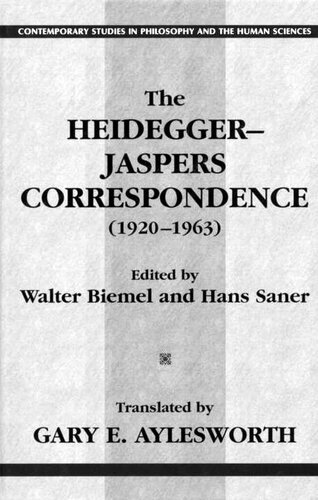

Most ebook files are in PDF format, so you can easily read them using various software such as Foxit Reader or directly on the Google Chrome browser.
Some ebook files are released by publishers in other formats such as .awz, .mobi, .epub, .fb2, etc. You may need to install specific software to read these formats on mobile/PC, such as Calibre.
Please read the tutorial at this link: https://ebookbell.com/faq
We offer FREE conversion to the popular formats you request; however, this may take some time. Therefore, right after payment, please email us, and we will try to provide the service as quickly as possible.
For some exceptional file formats or broken links (if any), please refrain from opening any disputes. Instead, email us first, and we will try to assist within a maximum of 6 hours.
EbookBell Team

4.0
96 reviewsThese letters provide extraordinary insights, both personal and philosophical, into two major thinkers of the twentieth century. Martin Heidegger and Karl Jaspers met at a celebration marking the sixty-first birthday of Edmund Husserl. Recognizing in each other a shared vision of what philosophy should be, they struck up a friendship, which continued through correspondence carried on over four decades and which weathered many vicissitudes.
While the first thirteen years of their acquaintance were marked by a collegial exchange of views on philosophical issues of mutual interest, their relationship changed significantly when the National Socialists came to power in 1933. Heidegger continued to teach at the fascist-controlled Freiburg University, and even joined the Nazi Party. By contrast, Jaspers, whose wife was Jewish, was forced into retirement. After the war, during the Freiburg de-Nazification process, Jaspers sharply criticized Heidegger's conduct but nonetheless stressed the lasting value of his philosophical contributions. Despite this conflict, the two men still found common ground and continued to correspond until 1963.
The letters touch on many points of philosophical interest to both men, yet only hint at the political turmoil that swirled around them. They discuss how they came to see themselves as personally connected but publicly misidentified as "existentialists." There are also many illuminating exchanges concerning Hannah Arendt, Karl Löwith, Max Weber, Edmund Husserl, and others. Editors Walter Biemel and Hans Saner provide a wealth of references and annotations that make these personal letters accessible to contemporary readers.
This first English translation of the correspondence between two giants of 20th-century German philosophy will be of great interest to philosophers, historians, and anyone intrigued by the Heidegger controversy.
About the AuthorWalter Biemel is professor emeritus of philosophy at the State Academy of Art in Dusseldorf, Germany. Hans Saner is a freelance writer and was the personal assiistant to Karl Jaspers from 1961 to 1969. Gary E. Aylesworth is professor of philosophy and chair of the philosophy department at Eastern Illinois University.